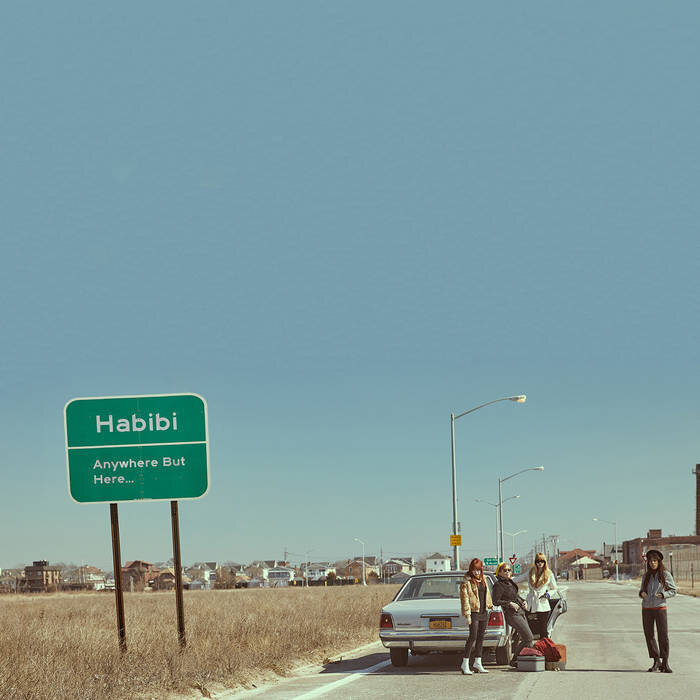by Tom Gallo (@lookatmyrecords)
After almost half a dozen years, Brooklyn’s Habibi have released their highly anticipated second full-length album, Anywhere But Here. The record represents a culmination of several years of songwriting and even revisits some of the band’s earliest, unfinished creative output in a way that explores new territory while staying true to what they do best.
Over the course of their career, the band has cultivated a fanbase and critical acclaim largely through their sonic diversity and unencumbered exploration of identity. Their sonic influences are a melting pot, mixing together Beach Boys styled harmonies, both American and Middle Eastern psychedelia, multilingual lyrics, and brash garage rock tones. Thematically, their name Habibi, which is the Farsi word for “my love,” gives you a slight glimpse into what they’re all about. While their Iranian roots have always played a central role in the band’s sound and ethos, Anywhere But Here expands and further explores the modern intricacies of cultural identity, the importance of friendship, and love, in an at times unfamiliar and contemptuous society.
Anywhere But Here largely radiates the sounds of longing for change and escape, as its title suggests. The songs on the record feature winding, dark guitar tones - oscillating between sleek, expansive psychedelia and more mellow surf rock riffs. Sandwiched between the album’s two singles, the swirling “Angel Eyes” and spellbinding “Come My Habibi,” are a slew of fine-tuned, varied tracks designed to hypnotize and beguile. Sonically, both “Bad News” and “Flowers” are two of the more psychedelic numbers, as they feature steady, nimble guitar work that digs deep into a groove laced tension. “Misunderstood” and “Born Too Late” represent nice counterpoints, and though the message of restlessness and unease pierces through via the lyrics, both are set against a warmer backdrop of jangling melodies and fluid, soft guitar tones. “In The City” is one of the more uptempo and edgier songs on the record with haunting “ohhs” and “ahhs” that pack a punch behind frolicking guitars. “Stronghold,” the record’s lone love song, sees the band continuing to perfect their unique blend of 60s vocal-pop, and “Hate Everyone But You” is quite possibly the poppiest song of the bunch. Driven by a classic sweet and sugary melody that’s snappy and inescapably catchy, the song is a distinct ode to female friendship and a feeling of isolation from the rest of the world.
“Come My Habibi,” the album’s lead single, is appropriately the final track of the record, as things really come full circle for the band. In a recent interview, frontperson Rahill Jamalifard and guitarist Lenny Lynch revealed that the song was one of the first that the two collaborated on back in 2012, and within its four-minute and thirty-second runtime, the track highlights many of the group’s trademark elements: pitch-perfect harmonies, a Farsi language refrain, and clean, sun-soaked garage-pop riffs.
Overall, Habibi serves up some of their best work yet on Anywhere But Here. Their songwriting is forceful and sharp, and they’re not afraid to toy with their well-executed formula in ways that accentuate their strengths. It’s the natural next step for a band that’s approaching the decade mark and only further solidifies them as one of New York City’s most unique and exciting bands.

